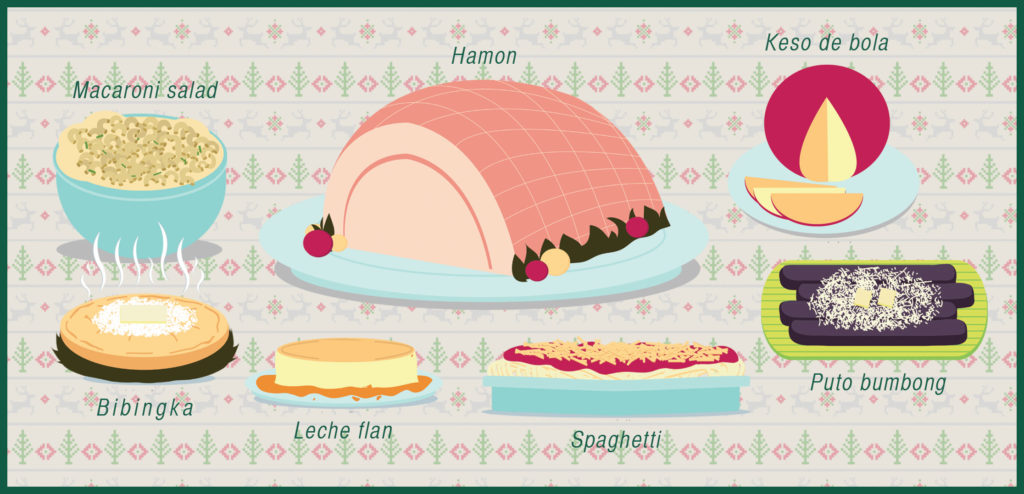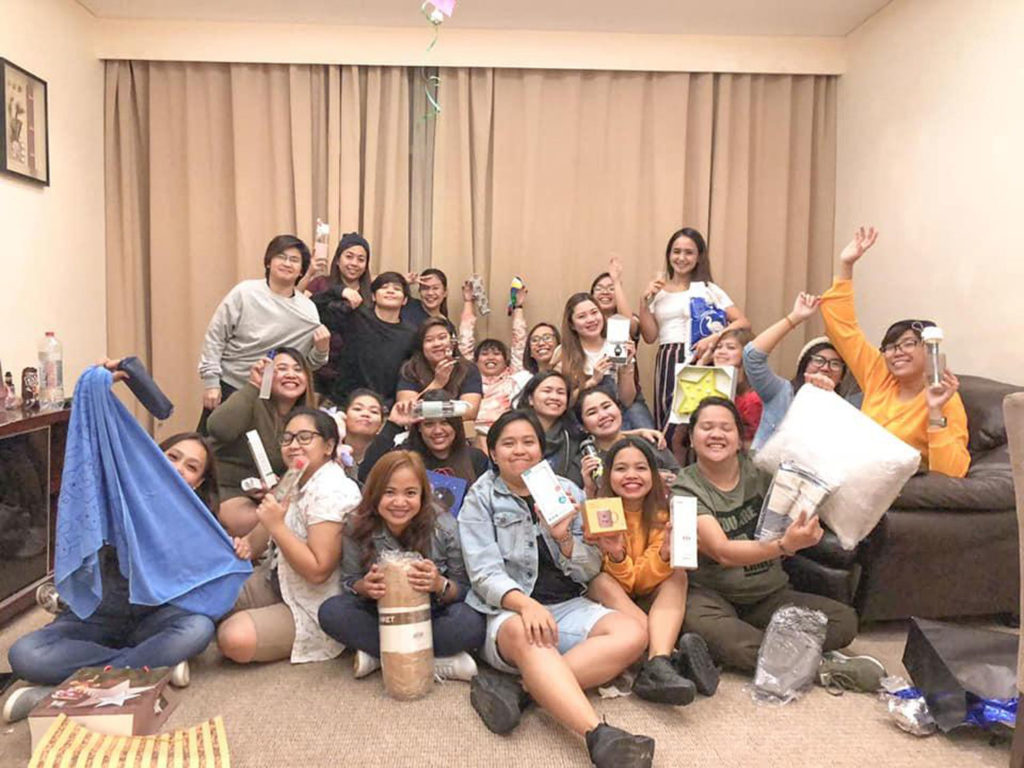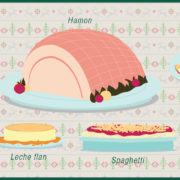FILIPINOS are known for their love for food and fellowship, and noche buena — which is Spanish for “night of goodness” — is the epitome of both of those combined.
Typically after the last Mass of Simbang Gabi, families go back home to a large spread adorning the dining table.
Though families may have created their own traditions, among the noche buena staples include favorite Filipino dishes such as lechon (roasted whole pig), pancit, barbecue, rice, adobo and native rice cakes (kakanin — biko, sapin-sapin, bibingka, puto bumbong, or cassava cake). However, Western influence has brought in spaghetti or fruitcake, and a fusion of Filipino with international dishes.

Here are some of the noche buena spread favorites:
• Hamon/hamonado – Ham, (from the Spanish jamon). Pork marinated in pineapple juice, sugar, salt and spices; then baked.
• Keso de bola – Literally, a ball of Edam cheese (a semi-hard cheese from Netherlands), usually with a red paraffin wax covering.
• Bibingka – Flat cake cooked in banana leaves with salted egg, kesong puti, served with butter and grated coconut.
• Lechon – Roasted pig, pork belly, chicken, fish — it means anything that’s roasted over coals. But in Filipino households, it is always the lechong baboy (pig) that rules over the table.
• Leche flan – The Filipino version of a creme brulee — but better. A mixture of egg yolks, condensed milk, fresh milk and sugar; this sweet concoction is steamed and topped with caramelized sugar.
• Macaroni salad – Although every Filipino has their own version, this dish starts with the same ingredients — pasta, mayonnaise and chicken. Others add carrots, celery, cheese and sometimes pineapple.
• Spaghetti – Filipino-style, that is. Made with tomato sauce and paste, ground beef or pork, cheese and a little sugar to sweeten the taste, the spaghetti is a Filipino staple in parties and for noche buena.
In some households, Christmas is a time for the families to reunite all relatives with their kin and clan depending on the number of family members. For a more close-knit type of family, they usually organize a reunion since this is the time of the year where most members are available. Some sort of production number whether a dance or song performance is assigned to the younger members of the family as a form of entertainment.
However, Overseas Filipino Workers (OFWs) often feel farthest away from home during the Yuletide season. The Philippines is famous for making a big deal about Christmas — celebrating it as soon as the “-ber” months start, so it can be a little, if not a lot, jarring to spend it in another country, away from home and your loved ones.
OFWs usually make do with their resources and imagination so their holidays can have that distinct Pinoy feel. For Regine Santelices, who’s celebrating her second Christmas in Dubai this year, one way to do this is by having a Filipino noche buena feast.

“Ours is the typical Filipino noche buena feast,” she said. “People here usually prepare menudo, fried chicken, Pinoy spaghetti, smoked ham, crispy pata, lumpia, and fruit salad.”
To battle homesickness last year, she called her family residing in Pasig City through Skype.
“There wasn’t any specific time for Skype since it was hard to get signal here. I tried different apps to call them but none of those worked except Skype,” she said.
However, since Dubai banned the instant messaging app this year, she had to look for other alternatives so she can continue being in touch with her family.
“I applied for a plan — international voice call for 300 minutes per month,” she said, adding that “I’m saving up minutes to call them this Christmas.”
Aside from having Filipino cuisine and contacting her family to fill her stomach and her heart respectively, she also mentioned the Christmas party that the Filipino community in Dubai throws annually as a noche buena tradition, as well.
“The good thing about Dubai is that there are a lot of Filipinos,” she said.
She added, “Even if you’re far away from your family, the fellow OFWs you’re with will somehow make you feel like you’re part of their family.
Their Christmas party usually consists of gift exchanges, grocery raffle, and karaoke.
“The one we anticipate for is the raffle for groceries. They give away rice, personal effects such as bath soap and the like, and other essential things. The cost of living here in Dubai is very high so this is important to us,” she said, sharing that she got a free rice supply for a month last year.
According to Regine, the feeling of sadness is still there — “it’ll take some time to get used to,” she admitted — but she remains positive, and promises to make the most out of the Christmas celebration this year.
Whether you celebrate noche buena among family and friends or in your new home away from home, the Filipino camaraderie and love for food are amplified during this evening.
Though the meal’s central focus may seem to be on the feast being served, the real reasons for getting together are the ever-present laughter, storytelling and love.






